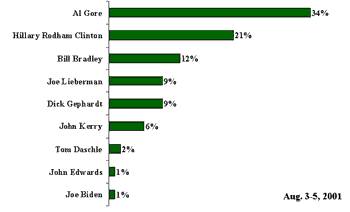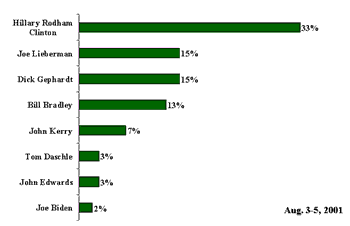GALLUP NEWS SERVICE
PRINCETON, NJ -- The contest for the presidency is never-ending, it seems, as potential Democratic candidates are already visiting Iowa and New Hampshire, meeting with local party leaders and testing the waters for a possible run in 2004 for the highest elected office in the country. At this stage of the process, at least among the general electorate, name recognition is a crucial element in any measure of potential support. And, according to a recent CNN/USA Today/Gallup poll, two of the most prominent names in the Democratic Party garner the most support for their party's presidential nomination: former Vice President Al Gore, and former first lady and now New York Senator Hillary Rodham Clinton.
Gore is the clear leader, with 34% of all Democrats saying they would support the party's 2000 nominee. Clinton comes in second, favored by 21% of the party, followed by former New Jersey Senator Bill Bradley with 12% support. The Democratic Party's vice presidential nominee in 2000, Connecticut Senator Joe Lieberman, draws 9% support, as does House Minority Leader Dick Gephardt. Massachusetts Senator John Kerry receives 6% of the vote, followed by Senate Majority Leader Tom Daschle with 2%, and Senators John Edwards from North Carolina and Joe Biden from Delaware with 1% each.
| Percentage of Democrats Who Support Each Candidate "Please tell me which of [the following candidates] you would be most likely to support for the Democratic nomination for president in the year 2004." |
 |
There has been some speculation in the news that Gore may not run, and in that case the leading candidate would be Clinton, with 33% of support among the party faithful. Lieberman and Gephardt tie for second, each with 15% of the vote, followed by Bill Bradley with 13%, and Kerry with 7%. Daschle, Edwards and Biden all receive 3% of the vote or less.
| Percentage of Democrats Who Support Each Candidate If Gore Does Not Run |
 |
2004 Election Could Be as Close as 2000 Election
Just as the 2000 election provided a photo finish, with Gore winning the popular vote by half a percentage point, the poll suggests that if the 2004 election were held today, it too would provide a very close race. A hypothetical contest between the two major candidates who ran in 2000 finds a dead heat among all Americans, with 48% each choosing George W. Bush and Al Gore. Among registered voters, Bush has a one-point advantage, 49% to 48%, but that difference is well within the margin of error of the poll, leaving the race too close to call.
Should Gore Run?
The poll asked Americans if Gore should run for president again in 2004, and 45% said he should, while 48% said he should not. Another 7% expressed no opinion either way. Among registered voters, the margin was 42% in favor and 51% opposed, also with 7% expressing no opinion. These results show that slightly more people would actually support Gore if he decided to run than indicate they want Gore to run in the first place. About a quarter of those who say they prefer Gore not to run would still support him, while about a fifth of those who say they want him to run would vote for Bush.
Among Democrats, 65% said Gore should run, although just over half that number -- 34% -- said they would support him for the party's nomination. In the hypothetical race against Bush, however, 95% of the Democrats who want Gore to run would vote for him, as would two-thirds of the Democrats who said they don't want him to run.
Survey Methods
Results reported here are based on telephone interviews with 1,017 national adults, aged 18+, conducted August 3-5, 2001. For results based on the total sample of national adults, one can say with 95% confidence that the margin of sampling error is +/- 3 percentage points. Results from the sample of Democrats are based on a sample of 490 Democrats/Democratic leaners. For results based on this sample, one can say with 95 percent confidence that the margin of sampling error is +/- 5 percentage points.In addition to sampling error, question wording and practical difficulties in conducting surveys can introduce error or bias into the findings of public opinion polls.
Suppose that the presidential election were being held today, and it included George W. Bush as the Republican candidate and Al Gore as the Democratic candidate. Would you vote for -- [ROTATED: George W. Bush, the Republican (or)Al Gore, the Democrat]?
As of today do you lean toward Bush, the Republican, or Gore, the Democrat?
|
Bush |
Gore |
OTHER (vol.) |
No opinion |
|
|
National Adults |
48% |
48 |
1 |
3 |
|
Registered Voters |
49% |
48 |
* |
3 |
|
* Less than 0.5% |
||||
|
(vol.) Volunteered response |
||||
Do you want Al Gore to run for president in 2004, or not?
|
Yes |
No |
No opinion |
|
|
% |
% |
% |
|
|
National Adults |
45 |
48 |
7 |
|
Registered Voters |
42 |
51 |
7 |
|
Democrats/Democratic Leaners |
65 |
31 |
4 |
